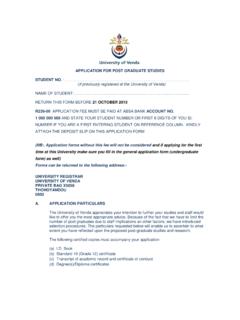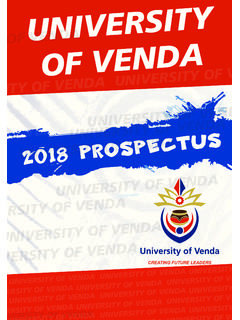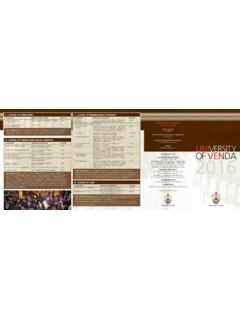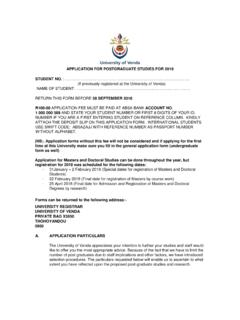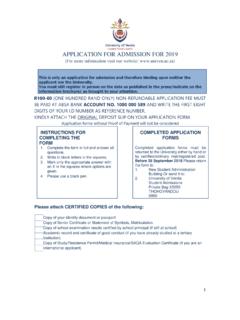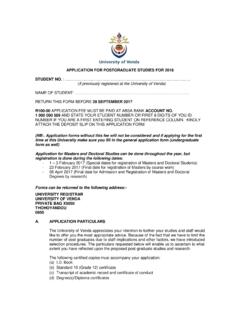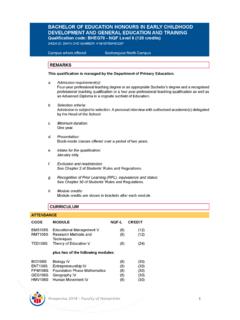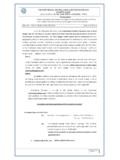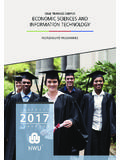Transcription of GENERAL RULES FOR DEGREES, DIPLOMAS AND …
1 GENERAL RULES FOR DEGREES, DIPLOMAS AND CERTIFICATES PART 1: RULES FOR BACHELORS DEGREES, DIPLOMAS AND CERTIFICATES Basic Definitions 1. A Problem: Means lack of knowledge in understanding a particular phenomenon or conflicting knowledge about the same phenomenon or lack of integration of skills in solving a practical, intellectual moral dilemma. 2. A Project: Means a well planned design that seeks to address a particular problem as defined by a particular department or clusters of departments. 3. Assessment : Means the evaluation of a student s achievement of the learning outcomes of a module through written, oral and other forms of evaluations.
2 4. Continuous Assessment: Means the evaluation of a student performance in an oral and written examination, tutorials, assignments and projects reports during a particular year of registration. 5. Core Module: A core module or compulsory ancillary module is a subject that must be passed before a curriculum is completed. 6. Co-requisite: If a module X is a co-requisite for a module Y, a student must register for module X simultaneously with the module Y. 7. Curriculum: A curriculum is a comprehensive programme of studies for a particular degree or diploma .
3 8. Examination : Means the act of examining a candidate s knowledge by means of written or oral tests. 4. Final Mark: A final mark for an ordinary, special, aegrotat examination or continuous assessment is a combination of the semester or year mark and the examination mark. In the case of supplementary examinations, the final mark is determined by the examination mark only. 10. Major subject: A major subject is that subject in a curriculum which determines the nature of the curriculum. The final examination in a major subject may not be written before the end of the final year of study in that subject. 11. Module: Means a coherent, self-contained unit of learning, which is designed to achieve a set of specific learning outcomes that are assessed within that unit of learning, and which is the smallest unit for which a final mark is entered in the student records.
4 12. Prerequisite: If a module X is a prerequisite for a module Y, a student must pass module X before he can register for module Y. 13. Programme: A combination of prescribed modules to be completed to fulfill the requirements for a specific qualification. 14. Recognition of prior learning: Means the granting of status or credit for previous learning and experience obtained by prospective student. 15. Semester module: A semester module following an assessment comprises the study of a subject over semester, and is the smallest unit in respect of which a candidate's performance is registered in the student records.
5 Except where RULES provide otherwise, semester modules may be taken in any sequence. 16. Semester Mark: A semester mark is a mark earned by a student in respect of tests, assignments, practicals, class participation, etc., during a semester. 17. Syllabus: A syllabus is the content of a module. The term module refers to a year or semester module. Module Codes 1. Each module is identified by a module code consisting of three capital letters, CHM. The subject code normally identifies the Department offering the module. Additionally, the modules comprising each subject are distinguished by a four-digit number.
6 2. The first digit indicates the year or, 0 = bridging or non-credit courses 1 = first year of study 2 = second year 3 = third year 4 = fourth year 5 = Honours 6 = Master s 7 = year 3. The second digit to show WHEN and DURATION of the module, 1 = first term 2 = second term 5 = first semester 6 = second semester 7 = year 4.
7 The third digit indicates the number of contact hours per week (as should be indicated in the timetable). 5. The fourth digit is used to indicate if more than one module is offered at the same time. 6. In the case of tutorial hours the letter t will be used at the end. In case that the module is repeated, another letter will be used at the end. An example for a module and its code could therefore be: PSY1542 PSY = Psychology module 1 = first year of study 5 = offered during the first semester 4 = four contact hours per week 2 = number of modules offered at the same time RULES Admission A candidate for the degree must have obtained the Matriculation certificate of the Committee of University Principals (SAUVCA) Matriculation Board, NSC/NCV certificate , a certificate of exemption granted by the Board or any other certificate that the Senate may approve.
8 A student must have obtained at least 50%, or an E Higher Grade or D Standard Grade in English. Appropriate prior learning in the relevant field of study will also be recognized as a criterion for admission. Minimum duration of study A student will indicate on registration, where Schools requires it, whether he/she is a full-time or part time student. Students shall register no more that the prescribed maximum number of modules per academic level. A student will be required to complete his/her degree within a period not exceeding two years of the prescribed period. (a) Bachelor's Degrees Students registering for a B.
9 degree shall be required to enrol for the following compulsory university wide core module - English Communication Skills (ECS) and BA 3 years BA(SW) 4 years BA (Ed) 4 years BA(Ed) (Agric) 4 years BA (RS) 3 years BAdmin 3 years BAgric 3 years BCom 3 years BEcon 3 years BERM 4 years BESc 4 years BA (Law) 3 years BA (Mus) 3 years BA (Crim Jus) 3 years BProc 4 years BCur 3 years BCur(Prax Ext) 4 years BSc 3 years BSc (Agric) 3 years BSc (Env Sc) 3 years BURP 4 years BSc (Sc.)
10 Ed) 4 years (b) Post-Graduate Degrees/ DIPLOMAS Pg. Dip. AS Pg. Dip. GS Post Graduate certificate in Education (PGCE) 1 year Honours 1 year BEd 2 years LLB 2 years Master's 1 year Doctors 2 years (c) DIPLOMAS diploma in African Studies diploma in Education Management 1 year diploma in Early Childhood Education 1 year Advanced diploma In Community Health Nursing Science 1 year (d)
